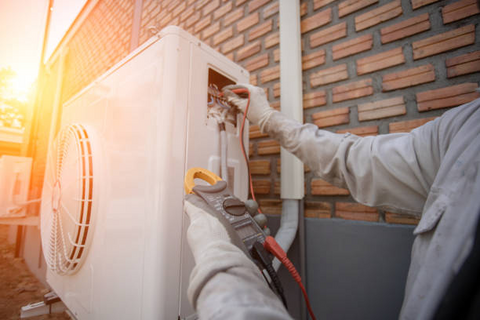As winter sets in and the temperature drops, the last thing you want is for your heat pump to leave you in the cold. If your heat pump is not providing the warmth you expect, there could be several reasons behind its chilly performance. In this blog post, we'll explore some common issues that may be causing your heat pump to underperform and discuss possible solutions to bring back the cosy comfort to your home.

Incorrect Thermostat Settings:
One of the simplest explanations for a heat pump not heating adequately is incorrect thermostat settings. Ensure that your thermostat is set to the desired temperature and is in heating mode. Sometimes, users may accidentally set their thermostats to cooling mode or lower temperatures, causing the heat pump to operate in a manner opposite to what is intended.
Solution: Double-check your thermostat settings and make sure it is set to the right temperature and mode.
Dirty or Clogged Air Filters:
Air filters play a crucial role in the efficiency of your heat pump. Over time, these filters can become clogged with dirt, dust, and debris, restricting the airflow. Reduced airflow can lead to inefficient heating performance as the heat pump struggles to circulate warm air throughout your home.
Solution: Regularly check and replace your air filters. Aim for a monthly inspection, especially during peak usage seasons.
Refrigerant Issues:
The refrigerant in your heat pump is responsible for absorbing and releasing heat. If there's a refrigerant leak or the refrigerant levels are too low, your heat pump will struggle to generate enough warmth.
Solution: Consult a professional HVAC technician to inspect and address any refrigerant issues. They can identify leaks, repair them, and recharge the refrigerant levels to optimal levels.
Outdoor Unit Obstructions:
The outdoor unit of your heat pump plays a crucial role in extracting heat from the outside air. If the outdoor unit is obstructed by debris, vegetation, or snow, it can hinder its ability to operate efficiently.
Solution: Regularly check and clear any obstructions around the outdoor unit. Keep the area around the unit clean and free from debris to ensure proper airflow.
Malfunctioning Defrost Cycle:
Heat pumps periodically switch to defrost mode in cold weather to prevent the outdoor unit from freezing. If the defrost cycle malfunctions, your heat pump may struggle to heat your home effectively.
Solution: If you suspect an issue with the defrost cycle, it's best to contact a professional HVAC technician to diagnose and repair the problem.
Electrical or Sensor Issues:
Heat pumps rely on various sensors and electrical components to function properly. Malfunctioning sensors or electrical issues can disrupt the heating process.
Solution: Seek the expertise of an HVAC technician to inspect and repair any faulty sensors or electrical components in your heat pump.
Professional Assistance
If your heat pump continues to underperform despite following the outlined troubleshooting steps, it is advisable to seek professional assistance. Certified HVAC technicians possess the expertise to diagnose and address complex issues, ensuring your heat pump operates at peak efficiency.
Conclusion:
A malfunctioning heat pump can leave you shivering in the winter months, but understanding the potential issues and implementing the right solutions can bring back the warmth to your home. Whether it's a simple thermostat adjustment or a more complex refrigerant problem, addressing these issues promptly will ensure your heat pump operates efficiently, keeping you comfortable throughout the colder seasons. If troubleshooting on your own becomes challenging, don't hesitate to enlist the help of a professional HVAC technician to diagnose and resolve any persistent heating issues.

